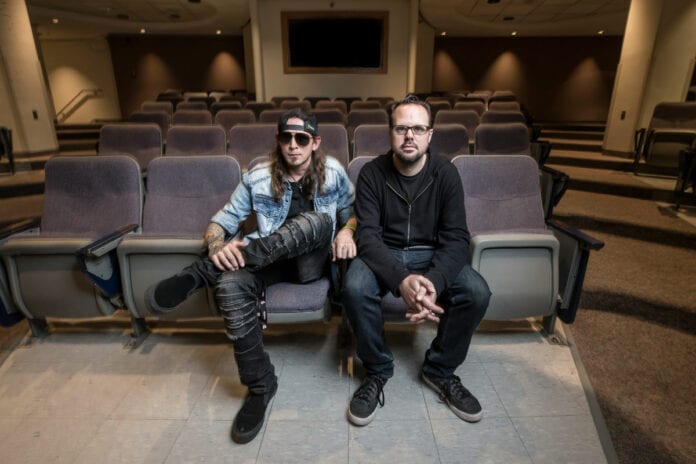
INTERVIEW WITH BRANDON MENDENHALL AND SÉBASTIEN PAQUET BY JEREMY SAFFER
PHOTOGRAPHS BY JEREMY SAFFER
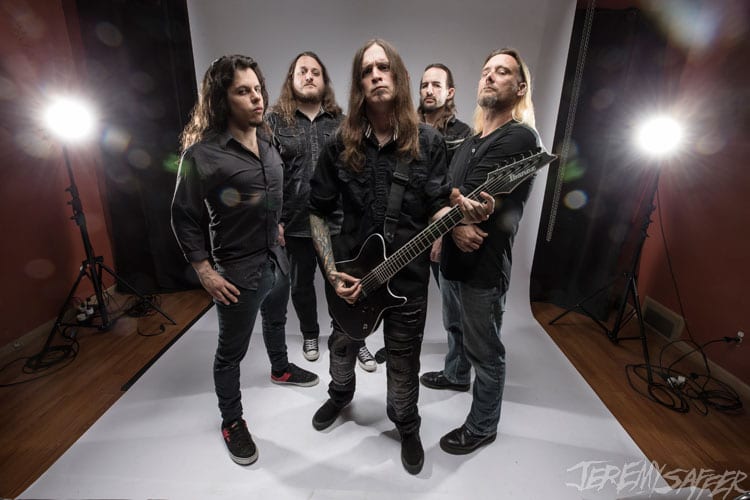
Brandon Mendenhall was told by doctors and his own family that he could never play a musical instrument due to his cerebral palsy. With inspiration and some help from Korn, Mendenhall never took no for an answer and persevered by teaching himself how to move his hands in order to play guitar and overcome the doubts of those around him to start his own band, The Mendenhall Experiment. Mind Over Matter is a documentary film by Sébastien Paquet chronicling Brandon’s journey from birth, his rocky childhood, and overcoming addiction, to becoming the guitarist you can see on tour. We spoke with Mendenhall and Paquet at a screening of Mind Over Matter at the ReelAbilities film festival in Boston to talk about the film, Brandon’s inspiring story, and how to conquer any challenges to make your dreams a reality.
What was it like growing up with cerebral palsy?
Mendenhall: Growing up with cerebral palsy was hard. Being different as a child, you’re automatically outcast and put into a box. Kids are pretty brutal, so they’ll single you out and then pick on you for whatever they single you out for. So, I dealt with a lot of bullying and being outcast and the black sheep. As I got older, it continued in social groups, dating, girlfriends, and that whole thing, so having a disability was challenging enough and then adding in trying to play an instrument on top of it was even more of a struggle.
Bullying is a recurring theme for those who are disabled. What advice would give to someone being bullied for who they are?
Mendenhall: Punch them in the throat. No, seriously, just don’t feed into it, because bullies feed on your attention and your dismay. If you don’t feed into it, if you don’t give them something to feed on, they’re going to get bored and move on. If they don’t move on, then you should seek help from an outside source.
How did you first come across music, and how did it inspire you?
Mendenhall: The first time I heard music, I got some cassette tapes for my birthday. It was Poison, Bob Seger, and Bon Jovi, and I was just enamored with it. Then I finally got into it when I heard heavy music bands like Korn, Nine Inch Nails, and Pantera. It was just like, “This is it, this is life.” I gravitated towards it, grabbed onto it, and haven’t let go since.
“I love metal because you can be yourself, and metal people don’t judge you by your appearance, what you’re into, or anything like that.“

What was it about metal music that really connected with you more than any other genre?
Mendenhall: I love metal because you can be yourself, and metal people don’t judge you by your appearance, what you’re into, or anything like that. I feel like I can be a part of something without being discriminated against, and as far as the music side of it goes—heavy guitars, the chugging, and heavy rhythms—bands like Korn, Pantera, and Hatebreed are the stuff I gravitate towards.
Sébastien, how did you find out about Brandon? How did your two cross paths?
Paquet: I was born in France, and I moved to California about 15 years ago with a big dream of becoming a documentary filmmaker here in the US. Brandon, at the exact same time, that exact same week, moved from a small town in Illinois to the entertainment capital of the world, Los Angeles, California. We ran into each other at a Korn concert of all places. I just saw a lot of similarities between the two of us. The thing that we mostly shared was our passion and love for the band Korn. We were at their show, and I was this French guy with a very thick French accent, even thicker than now at the time, and he obviously struggles, or struggled I should say, with his speech, because he is doing much better now. We just had many things in common. We both had a huge goal in life and a huge dream, and the two of us have an unbelievable drive. We always go for what we want to achieve and never take no as an answer. So, we became friends right away because we had so much in common. Then 10 years deep into our friendship, I realized when I woke up on Christmas morning of 2014, I’ve been searching for a great story to use as my first feature documentary, and the story has been right under my nose this entire time. I’ve been friends with this guy, and I ran into him 15 years ago for a reason. The reason being creating this beautiful film that is now inspiring its viewers.
Was there a solid idea of the story line you wanted to tell, or did it develop as you were filming?
Paquet: It really needed to be his life story from birth until this very day, so very early on we decided to fly to his small town in Illinois to spend a week over there and do one entire week of production on site to be able to illustrate his childhood years and teenage years. In his small town, we interviewed absolutely everyone in that city—the mayor of the town, the high school teachers, the ex-girlfriends, the classmates, the old bullies, the grandparents, the biological mother, everyone, you name it. The most important thing was to document and capture everything to illustrate his life, but in film, the strongest and most important points are your beginning and the end. We didn’t know the end when we started this process, and I didn’t want to force an end to the film. I wanted his hard work to come to fruition by itself for something great hopefully to happen in his career. So, we have a really genuine, legitimate, true, groundbreaking, inspiring ending, and through the power of music and through his talent, he created opportunities for himself in that recording studio with Munky from Korn and this huge opportunity opening up for Korn at Aftershock in front of 10,000 people.
Now that the documentary has been making its rounds, it’s been winning quite a few awards.
Paquet: I think we’ve got 11 at this point, but we spent a year and a half on the film festival circuit in the US and around the world. The crazy story is that Brandon had to get a passport made to leave the country for the very first time in his life to go to of all the places Moscow, Russia for a screening over there to show the film about his life story in front of a Russian audience and to perform a cover of the band The Doors with a Russian band for the closing ceremony of the film festival, which he won an award for. If you had told that to his 12- year-old self living in a trailer park in the middle of nowhere in Illinois, getting bullied left and right by everyone, and his own family members not believing in him and thinking that he would never amount to anything, talk about a Rocky underdog story.
Mendenhall: Actually, we’ve won eight awards in 11 film festivals, just for proper numbers sake (laughs).
Paquet: He’s good with numbers. I’m not.
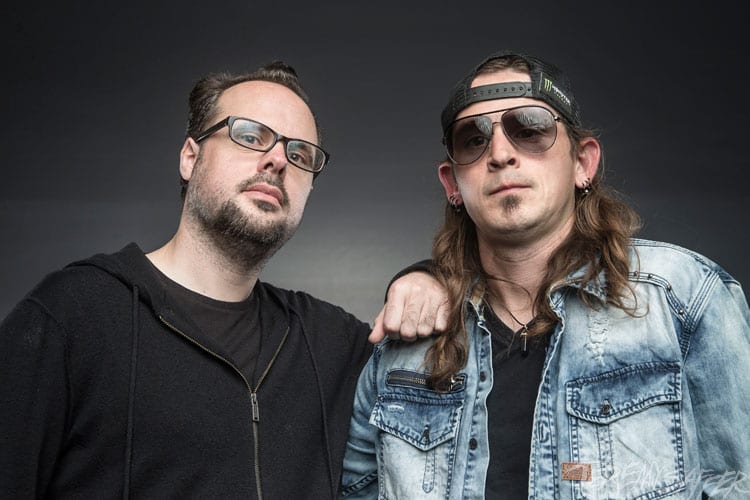
Have you seen your story and documentary have a positive effect on those who have watched it?
Mendenhall: Absolutely. I think almost everyone that has a heart that beats that sees this film can take something away from it. The film is a music based film, but it’s not just for music people. It’s for everyone. There’s something in this film for everyone to be able to take away from inspiration-wise. We see that resonating with everybody on the film festival circuit and even when the band goes out and plays shows. We get nightly testimonials from people that say, “Thank you so much. I never knew what I was capable of/what my child was capable of until I heard your story, or had seen you play or saw the movie.” That’s what we made this film for. The original goal of this film was to inspire and help as many people in the world with a disability, or people that interact with people with disabilities, as we possibly could, and I think we’ve achieved that tenfold.
Paquet: And whether you have a disability or not, you will feel touched by this film. It is not a film about a disabled person for the disabled community. It’s a documentary about a musician who is facing the obstacle of a disability in his path that can inspire anyone who is struggling with any kind of problem. It’s a very universal film.
How did Korn get involved with Brandon’s journey?
Paquet: Korn is a part of my life and a part of his life, so it only made sense to have them be a part of the story. Obviously, I have a unique relationship working and almost living with them for more than a decade. I’ve been on the road with them around the world time and time again in the last decade, so they were already aware of Brandon’s story and they were already friends somewhat. Once I talked to them about this project, they were all in. It wasn’t a question of do you want to be a part of it. It was more, we want to be a part of it, can we do this, this, and this? That recording session where Brandon brought one of his demos and Munky came to further the tune and better it together—I’ve been in the studio with Korn over the years documenting all of their ins and outs and crafting songs, but that recording session was really something special. Guess who was taking the reigns and calling the shots in the studio? It wasn’t James “Munky” Shaffer. It was this guy right here [points to Brandon], and that was very inspiring.
“I’ve been in the studio with Korn over the years documenting all of their ins and outs and crafting songs, but that recording session was really something special. Guess who was taking the reigns and calling the shots in the studio? It wasn’t James “Munky” Shaffer. It was this guy right here [points to Brandon], and that was very inspiring.”
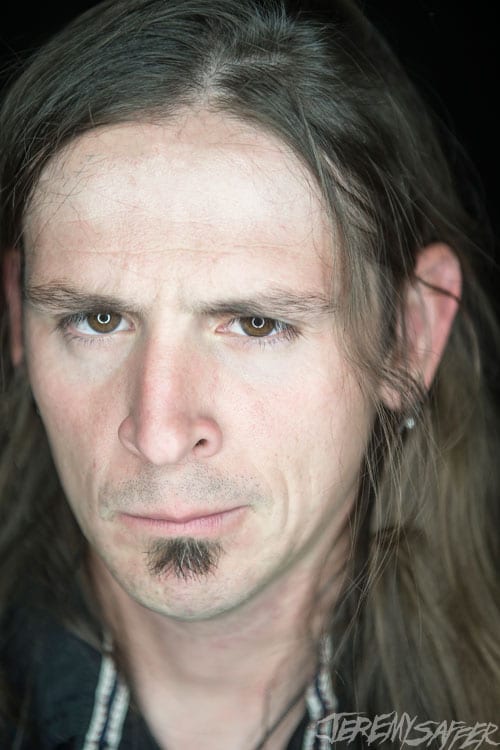
Mendenhall: It was cool to have Munky come in the studio and co-write that song “Prosthetic” with me. It started from a demo with three simple parts, and we took a whole day to build and finish the song into what you hear now, minus the vocals, of course. It was his idea. We asked, “Can you be a part of the documentary and do an interview?” And he said, “Yes, I can do that, but what if we go in the studio and I write a song with Brandon?” And then it became, “What if we take one of Brandon’s songs, further develop it, finish it together and you feature on it?” Then he said, “Yes,” and the rest is history.
Paquet: One of my goals working for Korn is to really show the people and the hearts behind those bodies with those long nasty smelly dreadlocks, and this film really shows that. It shows their humanity and what kind of people they are underneath all those looks. They are really amazing unique human beings and very talented musicians. This film shows yet again that Korn is much more than music. It always has been more than about just music for that band, but this film is yet another proof and illustration of that.
Mendenhall: And that was one of the things that made Korn in the very beginning my favorite band, because they were always that band that went out of the way for their fans no matter what. So, to get to showcase that with this film, to be able to bring that back to the forefront and throw a spotlight on it is a beautiful thing.
“In 1994, 1995 no lead singers were showing their vulnerability the way that Jonathan Davis was. The scene was dominated by someone like Phil Anselmo, who is this very manly man.”
Paquet: Korn broke a lot of grounds musically speaking, but they were true innovators when it came to the lyrical content at that time. In 1994, 1995 no lead singers were showing their vulnerability the way that Jonathan Davis was. The scene was dominated by someone like Phil Anselmo, who is this very manly man. So, for Jonathan to really open up and show that side of him, the true side of him and what he had to go through helped people who’d listen to his music and find themselves in those lyrics, like Brandon and even myself are prime examples of that. It’s people who can relate to what he has gone through, and this is why I say that Korn is more than music.
Mendenhall: Korn is a lifestyle, and the piece with Jonathan in the film, for him to step up and not only be a part of the film but be an open book like that and share those things to the world and to the Korn fans that he hadn’t really opened up about until that point was very cool, too.
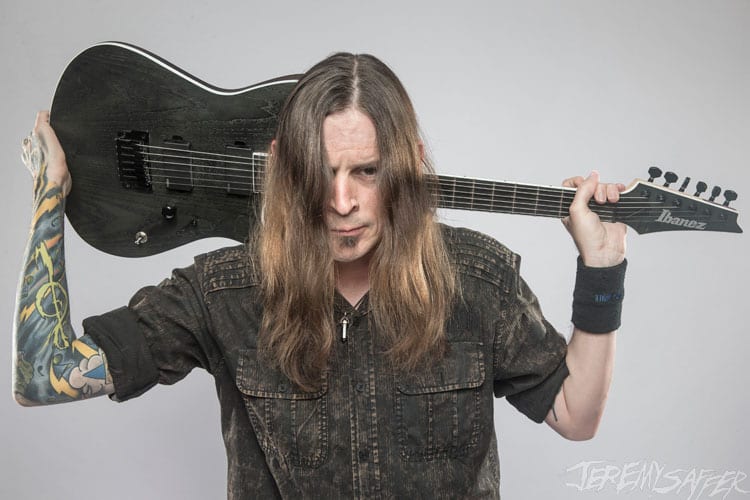
“My grandfather told me I’d never be a guitar player and to quit and stop dead in my tracks, that just made me inspired. I said, “Fuck you! Watch me. I’m going to do this no matter what, no matter how, this is what I want to do, this is who I am.”
What was the driving force that kept you going with practicing and eventually achieving your dreams?
Mendenhall: I was a very angsty kid and teenager, and I just wanted it. I wanted what Korn had, I wanted what Munky had, I wanted to be just like Munky and Head in every aspect. I just refused to let go, and the fact that my grandfather told me I’d never be a guitar player and to quit and stop dead in my tracks, that just made me inspired. I said, “Fuck you! Watch me. I’m going to do this no matter what, no matter how, this is what I want to do, this is who I am.” I groomed myself to be a musician from a very young age. I was buying clothes to wear on stage at age 17. I hadn’t even played a note yet, but I knew that’s what I wanted to do with my life.
Paquet: One of the reasons why Brandon gravitated towards Korn and Munky in particular is because of Munky’s incident with his finger. Brandon could definitely relate to that story in terms of his mobility issues in his own hand.
Mendenhall: Yeah, that was what really made Munky and Head so inspiring. Munky is my favorite guitar player, because when I read that story about how he cut the tip of his left index finger off in that accident, being stupid trying to sneak out to a party as a teenager—not like I’d done that before (laughs)—I was, “Look, these guys are opening for Megadeth! Dude, he’s opening for Dave!” I have all five of my fingers. I can play the guitar. I took the magazine and showed my grandmother and was, “Look, this guy did all of this despite having his finger reattached.” As I got further down the line, I learned that Munky had a guitar instructor that told him the story about Tony Iommi from Black Sabbath, because Munky said, “Do you ever think I can make it in the music industry?” And his instructor told him about Tony and how Tony cut his fingers off in that accident, so I took all of this information and internalized it and just made it the driving force platform for me to go forward and conquer.
Paquet: When you really think about it in the grand scheme of things, if you take a step back and look at all of that, it’s really Tony Iommi from Black Sabbath, the originator of the heavy metal sound, inspiring Munky, who revolutionized metal music in the 90s, who then inspires Brandon to pick up a guitar and to rehab his hand. And now Brandon is inspiring yet another generation of musicians by showing them that you should never take no as an answer. If he can do what he’s doing and accomplishing right now, then anyone can achieve anything.
Mendenhall: Yeah, I’m trying to be on the forefront of the revolution for the disabled community and say, “Hey, anything is possible. Go forth for your dreams because the only one stopping you is yourself.”
Many people often struggle with their actual and perceived limitations. What would you say to anyone fighting that battle?
Mendenhall: Just go for it. Go for it and never give up. I tell people all the time, “You only fail in life and at your goals when you give up. If you don’t give up, if you keep going, you’ll find a way. If you can’t do something one way, find a different avenue to do that same objective, because there’s always an alternative way of doing something.”
What was the process of rehabilitation for your left hand? Were there any specific exercises you did?
Mendenhall: Just the basic 1,2,3,4, 1,2,3,4, 4,3,2,1—the Zakk Wylde walking your hand up and down the neck and making it work. One piece of advice from Steve Vai that stuck with me is he said in an interview to focus on your strengths and ignore your weaknesses, so that’s a mantra that I keep in my head. For me, guitar was just a lot of boring, trying to make it work (laughs).
Are there any struggles or limitations you still face now?
Mendenhall: Oh, absolutely. I’m limited in my playing style that I’ve created for myself, but the way that I make that work is I surround myself with musicians that are much better than I am. I can play the root notes, I can keep the rhythms, and I can structure and write, but my band mates fill it all in and do the fancy stuff.
Paquet: His band is based around his limitations, which makes their music that much more beautiful and it really stands out next to another able-bodied band.
Mendenhall: But not in a negative way. It’s not like you can put a Mendenhall Experiment record next to another band and go, “That’s a disabled band, that’s disabled music,” because it’s not a genre that exists. We are a functioning rock band just like any other rock band. We just do it a different way.
Paquet: And if you come to a show, you’re going to rock out until the end of the night, and if the lead singer were not to tell you in the middle of the show that one of the two guitarists is disabled, you would never know.

Do you think your limitations gives the band a unique sound that no other able-bodied guitarist could attain?
Mendenhall: I think so, because with my guitar playing there is always that raw unrefined element. It’s kind of grungy and noise, but that’s what I’ve always loved about guitar. Bands like Korn, Alice in Chains, and Nirvana, it’s noisy and punk rock not really giving a fuck.
Have you found anything in the music world to be inaccessible due to your disability?
Mendenhall: There is a very small percentage of stages across the country that are actually disability accessible, but other than that I don’t know how to answer that question. I need management, I need a booking agent, I need a record label that believes in me, but I don’t know if it’s inaccessible because of my disability. I think what we encounter still is people not taking us seriously until we start to play. Once we start to play, it’s like a light switch. I’ve encountered that a lot throughout my career, touring and being in different places. I’ll get up on stage, and people will be snickering and making fun in the front row, like, “Oh, look at the way he walks. What the fuck is this? Is this a joke?” Then the lights go down, the first song starts, the hair comes down, and it changes like that. So, maybe the answer to that question is overcoming people’s initial perception.
Paquet: There’s a lot of stigma in today’s society, and there’s a huge stigma around disability and people who are disabled. Who is to say that my friend here cannot be as big and as successful as someone who was born a regular Joe? Absolutely nothing, and he’s proving it every day.
Mendenhall: There’s an excellent quote in the movie my singer Mario Valadez says. He said, “Normal people disable themselves everyday, and people that don’t have disabilities put disabilities on themselves.” I think that rings true for today. People live in the world of “I can’t.” And we’re trying to tell the world, “Live in the world of I can.”
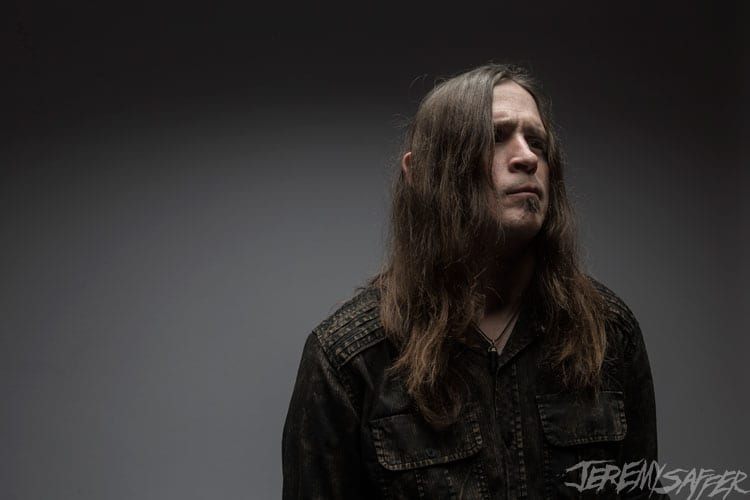
“You have to accept people with disabilities for who they are and not the disability they have. Treat people as people, not people with a disability.”
What do you think the music community can do to better its treatment of the disabled?
Mendenhall: It’s just like any other community, you have to accept people with disabilities for who they are and not the disability they have. The disability has to be secondary, if not a non-existent factor. Once you remove the disability and the would-be discrimination, you’re on an equal playing field. Treat all people as people. I think that with this band and with this film, that’s what we’re fighting for—a social change of that mentality. Treat people as people, not people with a disability.
Are there any improvements that music venues should make to better accommodate those who find them not as accessible?
Mendenhall: There could be a big improvement on the ADA sections in venues around the country. There needs to be more space. You still see a lot of disabled people, especially those in wheelchairs, being pushed to the back. I would like to see in the future that those sections get moved farther to the front.
“You still see a lot of disabled people, especially those in wheelchairs, being pushed to the back. I would like to see in the future that those sections get moved farther to the front.”
Paquet: It’s not even pushed in the back. It’s out of sight, out of mind, and there’s nothing more disrespectful than that.
Mendenhall: I have huge dreams and aspirations that when we make it to the arena level, I would like to have special seating side stage for those in wheelchairs and with different disabilities instead of packing the side stage with industry people. Let’s put these people on the side stage so they can be an active part of the show. That’s a huge dream, so we’ll handle that when we get there.
You mentioned there’s still a negative stigma surrounding the disabled. Do you think it’s getting better as more people are becoming educated about disabilities, or is it the same as when you were growing up?
Mendenhall: I think it’s becoming better from when I grew up in the 80s, and people are becoming more aware. People are becoming more active in change, but with that being said, there’s still a very high element of discrimination and putting people with disabilities in a box or to the side or tucked in the back.

“I don’t view myself as a disabled musician. I just view myself as a musician. The only fear I have is being as good or better than the next band beside me.”
Are there any fears you have being a disabled musician?
Mendenhall: No, because I don’t view myself as a disabled musician. I just view myself as a musician. The only fear I have is being as good or better than the next band beside me. Am I on the level? That’s the only thing that sticks in my mind all the time—putting out a commercial product that is on the level of everything else being produced.
There’s some really well known musicians out there with varying degrees of disabilities. Munky was a big inspiration for you, but were there any other musicians that have been an inspiration to you?
Mendenhall: Obviously, Tony Iommi.
Paquet: If you purchase the DVD version of this film, it comes with many bonus features, including one with one of Brandon’s idols, Jason Becker, who was the guitarist for David Lee Roth, and ALS struck him when he got that gig with David Lee Roth. We had the amazing opportunity to travel to Richmond, California in Northern California to go to his home for Brandon to perform for him by his bedside.
Mendenhall: All of your extremities one by one become stricken with ALS and become immobile, and it started in Jason’s leg and then it moved up to his waist and then his hands. Eventually, he couldn’t walk, then he was in a chair, and then he couldn’t play guitar.
Paquet: Today, the only thing he can move in his body is his eyeballs and his eyelids, so that’s how he actually communicates with his father who interprets the words that he’s spelling with eye movements and the blinks of his eyelids.
Mendenhall: His family created this whole language based on the eye movements that Jason can do, and he has a button when he wants to speak. He’ll hit the button, it makes a sound, then they pay attention to his eye movements, and it’s super quick. Going into the situation, I’m like, “How am I going to have a conversation with this guy?” And within the first five minutes, it’s like how you and I are talking. It’s non-existent, they’re so quick with it. But obviously Jason was a huge influence.
Do you feel more of the disabled musicians out there should be active and vocal for disability awareness like you are?
Mendenhall: If you have a disability and you’re succeeding in any career not just music but anything, I feel like you should be an active voice in inspiring others and trying to make a positive social change. That’s the only way the world is going to evolve in a positive fashion for others with disabilities.
Now that you’ve accomplished so much, are you still dealing with any negative attitudes or ignorance? When you do, how do you combat that and how do you deal with those situations?
Mendenhall: Aw man, I still deal with discrimination and people staring and looking and stupid comments and ignorant people. Most of it, I just shrug it off and keep moving. It’s truly them that have the problem and not me, and if you want to make a big deal about the way I walk or the way I talk, I don’t have time for it.
Paquet: Like Brandon says in the film, he is the one living with the disability and he has come to terms with it a long time ago, so if he can come to terms with it, why can’t they?
The Mendenhall Experiment has been gaining lots of momentum. How did you find the members for the current lineup?
Mendenhall: The lineup came pretty organically out of the fallout of the previous lineup, and we just knew each other, got in a room and jammed, and realized after that first jam session that everything clicked. Then we were off and running.
Paquet: What’s interesting about this lineup is the bass player faces some challenges of his own.
Mendenhall: Nathan [Stockton, bass] was the first one in this lineup. He and I connected. He wanted to be in the band when the previous lineup was going, so when it fell apart, he was the first guy that I called. Then we got Mike [Lira, guitar]. Mike got his brother Bruce [Lira, drums], and then we found Mario [Valdez, vocals] and his band fired him, so Mario was ours to keep (laughs).
“Nathan is partially blind and partially deaf, and eventually he is going to lose all of his sight, so he’s on borrowed time. It’s very cool and special to play music with him like we have been doing.”

With Nate being partially blind and partially deaf, do you think the band could end up being a champion of inspiration for many disabled musicians who want to do what you’re doing?
Mendenhall: Yeah, I would hope so. I would hope people would see what we’re doing and realize that they can do what we’re doing as well. I mean, don’t steal my gig (laughs), but in all seriousness I want to see other bands like ours come up and do what they do. Nathan is partially blind and partially deaf, and eventually he is going to lose all of his sight, so he’s on borrowed time. It’s very cool and special to play music with him like we have been doing.
You’ve played a bunch of shows over the past few years with some of big bands. Are there any favorite shows that really stick out to you?
Mendenhall: Definitely Aftershock 2016 is still at the top of the heap. We did a charity event for human trafficking with our friend Kevin Estrada, and he put us on as direct support for Papa Roach in Hollywood, which was one of my favorite ones. Being on tour and playing with Smile Empty Soul in Atlanta at The Masquerade, we had a killer show there. Coming back to Hollywood and being direct support for Smile Empty Soul at the Whiskey and killing it there. At another Whiskey gig, we did the official Lemmy memorial show with Metal Allegiance. When Lemmy passed away, we got the call from the Whiskey, and it was sold the fuck out and by far one of the coolest shows we’ve ever done. Opening for Suicide Silence at The Observatory for their album release party was sick, too.
The Aftershock performance is in the film isn’t it?
Mendenhall: Yes, it is.
With performing live and studio recording being so different, either playing for hours or playing for a few minutes, is one easier or more difficult than the other?
Mendenhall: Recording in the studio is more challenging because you have to nail everything to the millisecond. It has to be on time. So, for me, I have to practice my ass off and get my parts right and really know what I’m doing and really focus on playing clean. When we play live, I can black out and be dirty and be loose. You don’t have that luxury when you’re in the studio.
What should people expect if it’s their first time seeing The Mendenhall Experiment live?
Mendenhall: A high energy, kick-ass rock show that’s going to kick you in the teeth from the first note to the last note. If you don’t know who we are before you see us play, you’ll know who we are before we’re done, and you’ll want to know more about the band and become one of our friends, not fans, but friends.
Paquet: And again, if the singer were to not tell you Brandon’s life story in the middle of the set, you’d never know that two of the musicians on that stage rocking your face off for 40 minutes are actually disabled. You would never know.
Is it important for the singer to bring that up every show?
Paquet: Absolutely, because the stories are a part of the music and the music is part of the story.
Mendenhall: There’s been some people that have said and believed, “Oh, why do you have to do that? Why do you have to have this piece in the middle of your set?” And I think it’s absolutely mandatory. We take those two minutes to give a testimony of what I’ve been through, what Nathan has been through, and to say, “Hey, look, at that moment we put ourselves on a pedestal, but we do it with a purpose, to help inspire and help other people.” That to me is what makes us and sets us apart from every other band in the genre. Some people may call it a gimmick, it’s not. It’s a movement that’s going to last a lifetime.
Paquet: I don’t see it as putting yourself on a pedestal. I think it’s the exact opposite. It’s making yourselves vulnerable and really being transparent and being an open book to be like this is who we truly are, but this is the music we can make regardless.
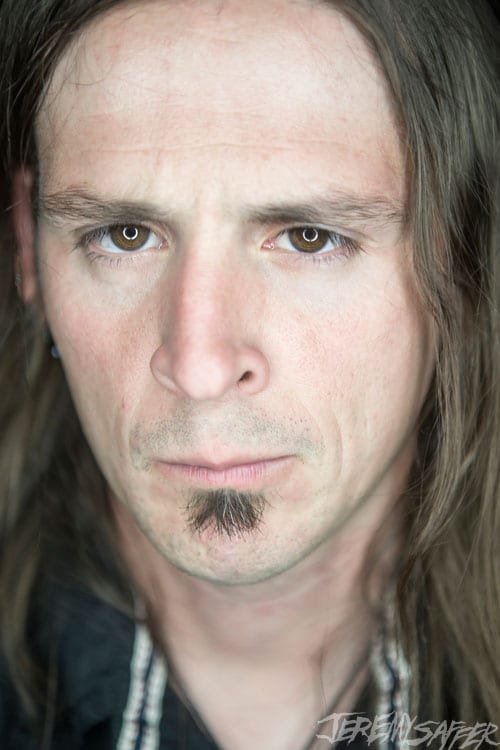
“I get asked a lot, “If you could go back, live your life, and erase cerebral palsy and be normal, would you do it?” The answer to that question is absolutely not. I would not be the person I am today without my disability”
Mendenhall: And letting people know that our disabilities don’t define who we are or limit us. If I didn’t have Cerebral Palsy, I wouldn’t be sitting in this chair talking to you right now. That’s the big catch-22. I get asked a lot, “If you could go back, live your life, and erase cerebral palsy and be normal, would you do it?” The answer to that question is absolutely not. I would not be the person I am today without my disability and without all of this bullshit that I’ve had to persevere through.
Paquet: If anything, it only makes you better and stronger.
Sébastien, what effect has Mind Over Matter had on you as a filmmaker?
Paquet: The film and this project and this 15 year long friendship has changed my life time and time again. It’s changed my career in many ways, but it has really changed me as a person. The inspiration that I get daily from Brandon, everything that he has to go through on a daily basis, is motivation to never take no as an answer myself and to always try to push the envelope and try to create something great.
Mendenhall: Sébastien making this film, Mind Over Matter, has changed my life completely. It’s the biggest accomplishment of both of our lives at this point. I never thought of myself as being a film star or subject, and I was a very shy kid growing up, so for my life to do a complete 180 and to do this film and put my whole life in front of a camera and to be an open book like I have been, it was challenging, but I’m glad I did it, and the rewards from it have been endless. It’s built my confidence, it gave my band The Mendenhall Experiment a solid platform to launch off of, and it set me up to be a public speaker and a public figure to help other people, You can’t ask for anything better than that.
Paquet: The person sitting next to me is very different from the kid that I could barely understand when he spoke when I met him 15 years ago. I’m beyond proud of everything that he has achieved and the 180 that he did in his life. For me, to be a small instrumental part in this 180, that’s a huge honor.
Mendenhall: Sébastien is being very humble when he says small part, because he’s helped to grow and mold and launch my career in ways that without him going to bat for me I wouldn’t be here. I’m truly grateful for that.
Are there any charities or groups people should be supporting to help disabled people achieve their dreams?
Mendenhall: United Cerebral Palsy as the national and definitely United Cerebral Palsy of Los Angeles, which I’m an integrated part of, being on the board of governors. I’d also fully support the Shriners Organization. They helped me out a lot when I was a kid, and I’ve never forgotten what they’ve done for me and my family as far as them being a nonprofit hospital. I will always support them.
Paquet: CP Alliance, which is never giving up the fight for research to hopefully, eventually one day cure this disability.
Mendenhall: There’s a community of disabled musicians called The Can-Do Musos. It’s a global community. It’s run by my good friend Andrew Hewitt, who’s based out of Australia and created this community to bring all of these different disabled musicians together to play music and be united under the common thread of being a musician.
Now that the film festival run is nearly complete, what are your goals moving forward?
Paquet: We hope to take this film to every school around the nation and worldwide. I think it can have a great impact on the youth. Bullying is unfortunately still a very current social topic, and I think this film can be helpful in a classroom setting. Besides that, the film is now available on all the digital outlets—iTunes, Amazon, YouTube—and you can watch it via mindovermatterfilm.com, thanks to our great friends at Sumerian Films and Records.
Mendenhall: When Sébastien says schools, he means colleges and high schools around the nation. The next big step for us is to figure out how to take the film and make it into a public speaking platform that we can travel with and get the film out to the younger generation. I think it’s really going to resonate with them and create a social change as well. Maybe that will help knock out some of the bullying. If they see it on a ground level when they’re young, maybe it will inspire them to stomp out the bullying if they see it happening.
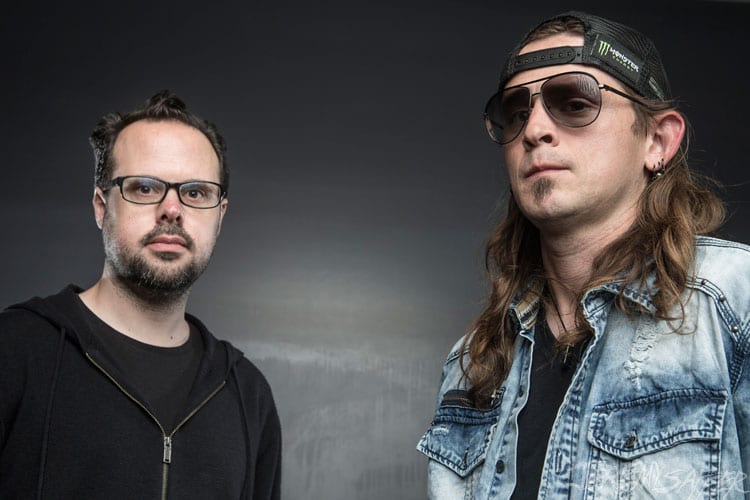
Is there a physical release of the film?
Paquet: Yes, the film is available everywhere as a DVD with some awesome bonus features, including our great scene with our friend Jason Becker.
Mendenhall: And the Chicago Bulls, I might add. So, yeah, it’s available on Amazon, DVD, everywhere.
Mind Over Matter is available here
Follow The Mendenhall Experiment here




















